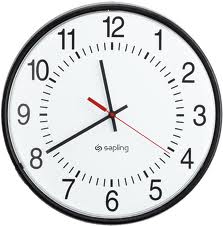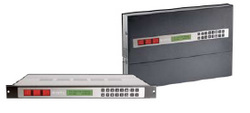Two Important Questions to Ask before You Purchase Your Master Clock

Master Clocks come in many varieties. Some may have features geared towards military applications, while some may have features specific to a healthcare environment. Some master clock systems are wired, other use wireless clocks. In contrast, there are features and capabilities of any master clock that, no matter what the application, should be present. As you search the internet and speak with sales representatives across many manufacturers, keep these necessary factors on your mind to allow them to assist you in making the right purchase. The following two questions are ones that should always be asked, and never go unanswered, as you scrutinize each master clock on the market.
1. Does it have input redundancy?
Master clocks are, in their simplest form, a time reference. All slave clocks refer to the master clock to receive their time, which is why the source from which the master clock receives its own time is just as important. If a master clock has only one time source and that time source happens to fail, the accuracy of the master clock and slave clocks is jeopardized. This is why it is crucial for the master clock to have a back-up time source, otherwise known as “input redundancy”. For example, a master clock’s primary source of time may be from a GPS receiver. If the GPS receiver fails to communicate correctly with the master clock, the master clock should have a back-up reference, like a connection to an NTP time server to assure continuous synchronization. During your research, be sure to verify that the master clock you are researching has the ability to reference a second or even a third time source.
1. Does it have input redundancy?
Master clocks are, in their simplest form, a time reference. All slave clocks refer to the master clock to receive their time, which is why the source from which the master clock receives its own time is just as important. If a master clock has only one time source and that time source happens to fail, the accuracy of the master clock and slave clocks is jeopardized. This is why it is crucial for the master clock to have a back-up time source, otherwise known as “input redundancy”. For example, a master clock’s primary source of time may be from a GPS receiver. If the GPS receiver fails to communicate correctly with the master clock, the master clock should have a back-up reference, like a connection to an NTP time server to assure continuous synchronization. During your research, be sure to verify that the master clock you are researching has the ability to reference a second or even a third time source.
2. Does it have memory back-up?
During power outages or any other interruptions to the power supply of a master clock, losing data, configuration, or just accurate time can be devastating. For example, a facility may have a very complicated configuration of their master clock with various schedules set for commencing time correction of various clocks or even operating systems separate from the clock system, such as an air conditioning or bell system. If this configuration is lost due to even a minute long power outage, or because the user decides to relocate the master clock, re-establishing each and every setting and configuration for the master clock would be as time-consuming as it would be difficult. For this reason, asking a manufacturer if their master clock has a memory back-up is always an important question in your buying process.
In a world where synchronized time is becoming more prevalent every day, master clocks are being developed by various manufacturers, adding new options that are extremely beneficial for many facilities. However, as these master clocks are driven farther and farther into development, these two very important, yet basic features mentioned above are the foundation of a reliable master clock and should remain a standard for all master clocks. As you delve deeper into your research, make sure and pose these two questions to any manufacturer you come across and guarantee yourself the right product for your facility.
During power outages or any other interruptions to the power supply of a master clock, losing data, configuration, or just accurate time can be devastating. For example, a facility may have a very complicated configuration of their master clock with various schedules set for commencing time correction of various clocks or even operating systems separate from the clock system, such as an air conditioning or bell system. If this configuration is lost due to even a minute long power outage, or because the user decides to relocate the master clock, re-establishing each and every setting and configuration for the master clock would be as time-consuming as it would be difficult. For this reason, asking a manufacturer if their master clock has a memory back-up is always an important question in your buying process.
In a world where synchronized time is becoming more prevalent every day, master clocks are being developed by various manufacturers, adding new options that are extremely beneficial for many facilities. However, as these master clocks are driven farther and farther into development, these two very important, yet basic features mentioned above are the foundation of a reliable master clock and should remain a standard for all master clocks. As you delve deeper into your research, make sure and pose these two questions to any manufacturer you come across and guarantee yourself the right product for your facility.

